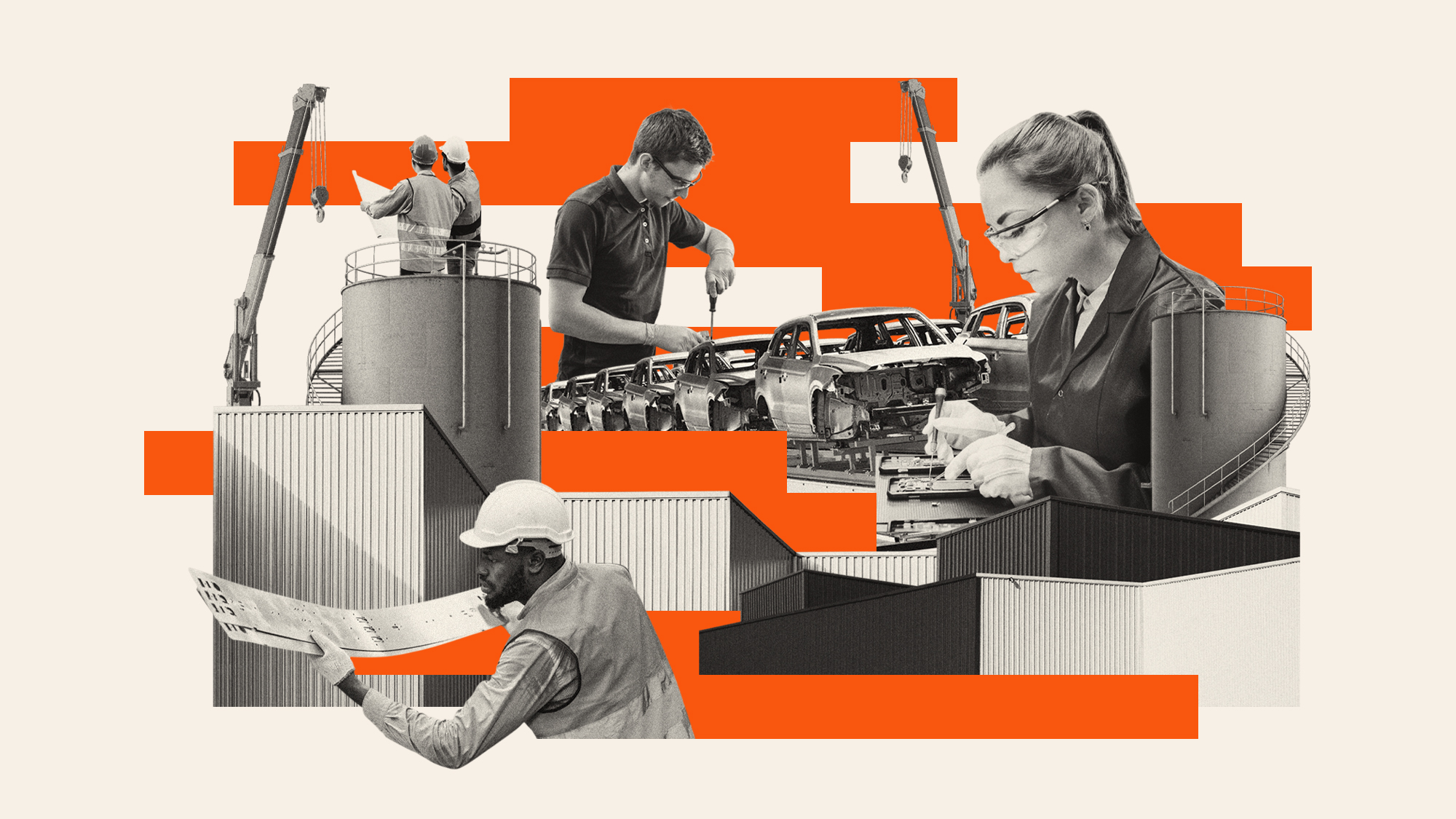Trump is trying to jump-start US manufacturing. Is it worth it?
The jobs are good. The workers may not be there.


A free daily email with the biggest news stories of the day – and the best features from TheWeek.com
You are now subscribed
Your newsletter sign-up was successful
President Donald Trump wants a "manufacturing renaissance" for the American economy. No more making iPhones in China or cars in Mexico: The president expects those jobs and factories to come "roaring back into our country." Some observers wonder if his policy overly romanticizes manufacturing jobs, or if those jobs can be filled.
Skeptics say Trump's tariff-driven efforts to bring manufacturing home might be "more about nostalgia or political pandering" than what is best for workers, said NPR's Planet Money. Actually, the manufacturing sector "punches above its weight." One study found that manufacturing employs just 10% of Americans but provides 20% of the country's "good jobs" that pay well regardless of a worker's educational background. But that doesn't necessarily make Trump's policy correct. "I think we've developed a kind of collective fetish" for manufacturing jobs, said Harvard University economist Gordon Hanson.
What did the commentators say?
Even when the jobs are good, it is not clear who will work them. "Companies are struggling to fill" more than 450,000 open manufacturing jobs across the country, said The Washington Post. The problem will get worse as American workers get older. The aging workforce has "long been a challenge for us," said Carolyn Lee, president of the Manufacturing Institute.
The Week
Escape your echo chamber. Get the facts behind the news, plus analysis from multiple perspectives.

Sign up for The Week's Free Newsletters
From our morning news briefing to a weekly Good News Newsletter, get the best of The Week delivered directly to your inbox.
From our morning news briefing to a weekly Good News Newsletter, get the best of The Week delivered directly to your inbox.
Nostalgia for the golden age of American manufacturing "will make the U.S. poorer," said Tej Parikh at the Financial Times. The "allure" of bringing back that age is "clear," but backing Trump's trade wars requires a belief that "America can, and should, bring back labor-intensive factory jobs." In truth, American manufacturing output has increased in recent decades even as the number of jobs dropped, and the U.S. is already a "manufacturing superpower." Creating even more factories and factory jobs will be "hard, undesirable and difficult to achieve with tariffs."
American companies are having trouble filling those jobs but "not because of trade policy," said Allysia Finley at The Wall Street Journal. While "productivity-enhancing technology" and "inexpensive imports" once caused a loss of manufacturing jobs, the generation that suffered those losses is "sailing into the sunset." Right now there are "fewer young Americans who want to work in factories" because they do not want to do "jobs they view as beneath them." It is time to remind Americans that there is "dignity in any work."
What next?
Trump's tariffs "won't bring manufacturing back," said Business Insider. That is based on a Wells Fargo analysis that found "high labor costs and a lack of workers" would make reviving factory jobs an "uphill battle." American companies would have to spend $2.9 trillion to bring manufacturing employment back to 1979 levels. The president's trade wars aim to "spur a durable rebound in U.S. manufacturing employment," said the Wells Fargo report. But a "meaningful increase" in that employment "does not appear likely in the foreseeable future."
A free daily email with the biggest news stories of the day – and the best features from TheWeek.com
Joel Mathis is a writer with 30 years of newspaper and online journalism experience. His work also regularly appears in National Geographic and The Kansas City Star. His awards include best online commentary at the Online News Association and (twice) at the City and Regional Magazine Association.
-
 Local elections 2026: where are they and who is expected to win?
Local elections 2026: where are they and who is expected to win?The Explainer Labour is braced for heavy losses and U-turn on postponing some council elections hasn’t helped the party’s prospects
-
 6 of the world’s most accessible destinations
6 of the world’s most accessible destinationsThe Week Recommends Experience all of Berlin, Singapore and Sydney
-
 How the FCC’s ‘equal time’ rule works
How the FCC’s ‘equal time’ rule worksIn the Spotlight The law is at the heart of the Colbert-CBS conflict
-
 Is the US in a hiring recession?
Is the US in a hiring recession?Today's Big Question The economy is growing. Job openings are not.
-
 Trump wants a weaker dollar, but economists aren’t so sure
Trump wants a weaker dollar, but economists aren’t so sureTalking Points A weaker dollar can make imports more expensive but also boost gold
-
 Did markets’ ‘Sell America’ trade force Trump to TACO on Greenland?
Did markets’ ‘Sell America’ trade force Trump to TACO on Greenland?Today’s Big Question Investors navigate a suddenly uncertain global economy
-
 Buffett: The end of a golden era for Berkshire Hathaway
Buffett: The end of a golden era for Berkshire HathawayFeature After 60 years, the Oracle of Omaha retires
-
 Will Trump’s 10% credit card rate limit actually help consumers?
Will Trump’s 10% credit card rate limit actually help consumers?Today's Big Question Banks say they would pull back on credit
-
 Can Trump make single-family homes affordable by banning big investors?
Can Trump make single-family homes affordable by banning big investors?Talking Points Wall Street takes the blame
-
 What will the US economy look like in 2026?
What will the US economy look like in 2026?Today’s Big Question Wall Street is bullish, but uncertain
-
 Tariffs have American whiskey distillers on the rocks
Tariffs have American whiskey distillers on the rocksIn the Spotlight Jim Beam is the latest brand to feel the pain
